'I'm living proof brain tumour research saves lives'
 Brain Tumour Research
Brain Tumour ResearchA teenager who had to learn to walk and read again after being diagnosed with a brain tumour the size of a small grapefruit said she is "living proof that research saves lives".
Indi Powell, 18, from Windsor, Berkshire, was 14 when she began experiencing severe headaches while living in the US in 2021.
An MRI scan revealed an aggressive a grade four glioblastoma - a fast growing type of brain tumour - on the right side of her brain.
Ms Powell said she felt "so lucky" that her tumour had been found and removed in time but added that "more awareness and more research" into the disease were needed.
 Brain Tumour Research
Brain Tumour ResearchFollowing her diagnosis, doctors warned her there was a significant risk she would lose mobility and may need to learn to walk and read again.
After her emergency surgery at UNC Chapel Hill in North Carolina she said she could talk but could not control her body very well.
"It was confusing and frustrating, I knew how to read but when I looked at words, I had no idea what they meant," she said.
Ms Powell permanently lost her periphery vision and spent three weeks in hospital.
She required extensive therapy to regain her mobility and reading skills.
Later, she underwent a second surgery to remove what remained of the tumour and had 32 rounds of radiotherapy, and multiple cycles of chemotherapy over six weeks.
During the height of the Covid-19 pandemic, she could only have one parent at a time with her during treatment.
Her mother Lori said it had been "heartbreaking" but said her daughter had shown "unbelievable strength".
Ms Powell was later accepted on to a clinical trial in Washington DC for T-cell infusion therapy, which uses a patient's own immune cells to fight cancer.
"That trial gave me hope, my cells produced the most T cells out of everyone that took part, so I was able to keep going," she said.
 Brain Tumour Research
Brain Tumour ResearchMs Powell is now back in the UK completing her secondary education in Windsor and is working with Brain Tumour Research to raise awareness of the disease.
"I feel so lucky my tumour was found in time and that surgeons were able to remove it.
"But not everyone is as lucky. We need more awareness and more research.
"I'm living proof that research saves lives."
According to Brain Tumour Research, about 12,000 people are diagnosed with a primary brain tumour each year and the disease kills "more children than leukaemia".
The charity's community development manager Louise Aubrey said Ms Powell's story was "a reminder of how suddenly and drastically brain tumours can change a young person's life".
"Brain tumours kill more children and adults under the age of 40 than any other cancer yet, historically, just 1% of the national spend on cancer research has been allocated to this devastating disease.
"We urgently need more funding to improve outcomes for patients like Indi."
The charity is the driving force behind a call for a national annual spend of £35m in order to improve survival rates and patient outcomes in line with other cancers, such as breast cancer and leukaemia.
You can follow BBC Berkshire on Facebook, X (Twitter), or Instagram.
